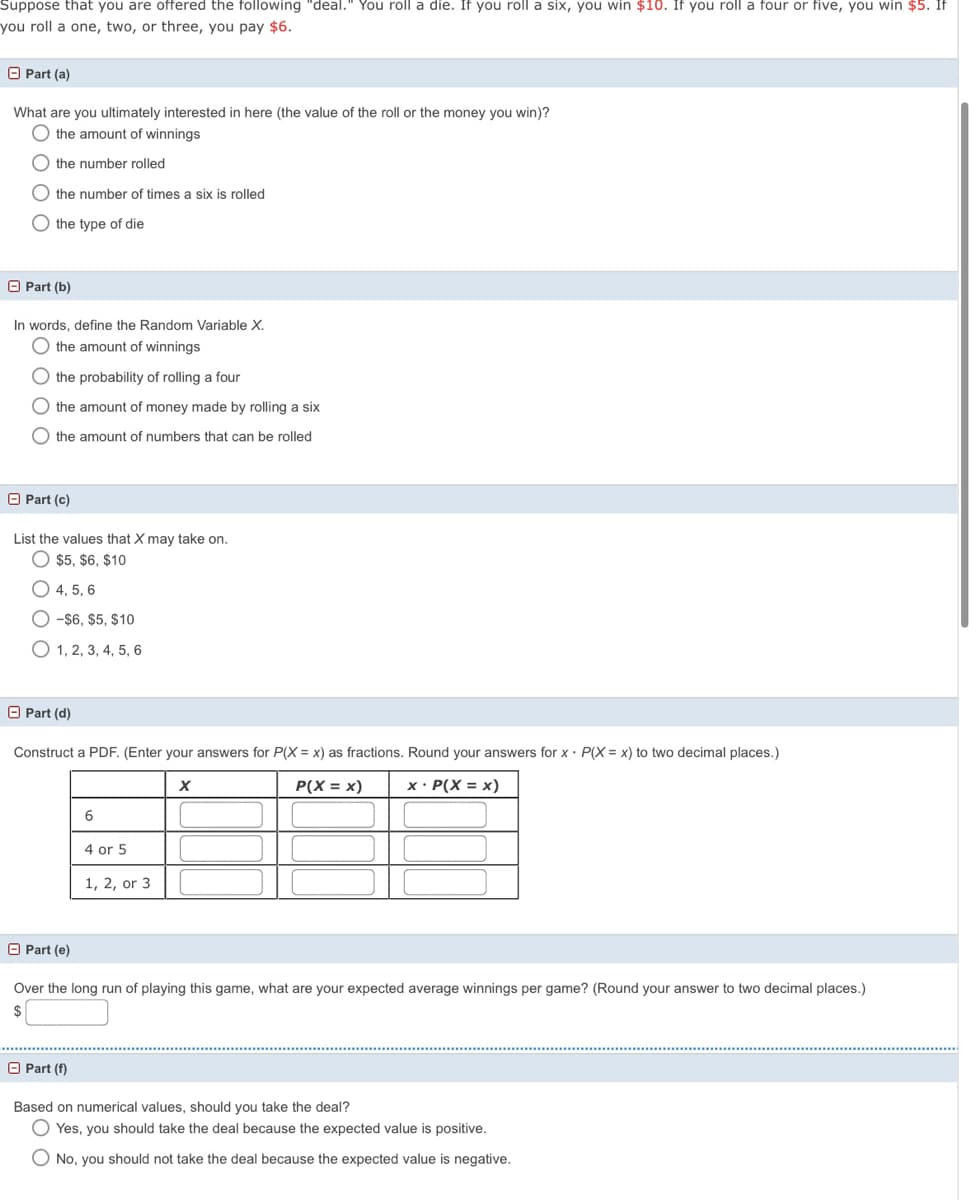six, you you roll a one, two, or three, you pay $6. O Part (a) What are you ultimately interested in here (the value of the roll or the money you win)? O the amount of winnings the number rolled the number of times a six is rolled O the type of die O Part (b) In words, define the Random Variable X. O the amount of winnings the probability of rolling a four the amount of money made by rolling a six O the amount of numbers that can be rolled O Part (c) List the values that X may take on. O $5, $6, $10 O 4, 5, 6 O -S6, $5, $10 O 1, 2, 3, 4, 5, 6
six, you you roll a one, two, or three, you pay $6. O Part (a) What are you ultimately interested in here (the value of the roll or the money you win)? O the amount of winnings the number rolled the number of times a six is rolled O the type of die O Part (b) In words, define the Random Variable X. O the amount of winnings the probability of rolling a four the amount of money made by rolling a six O the amount of numbers that can be rolled O Part (c) List the values that X may take on. O $5, $6, $10 O 4, 5, 6 O -S6, $5, $10 O 1, 2, 3, 4, 5, 6
College Algebra (MindTap Course List)
12th Edition
ISBN:9781305652231
Author:R. David Gustafson, Jeff Hughes
Publisher:R. David Gustafson, Jeff Hughes
Chapter8: Sequences, Series, And Probability
Section8.6: Permutations And Combinations
Problem 70E
Related questions
Question

Transcribed Image Text:Suppose that you are offered the following "deal." You roll a die. If you roll a six, you win $10. If you roll a four or five, you win $5. If
you roll a one, two, or three, you pay $6.
O Part (a)
What are you ultimately interested in here (the value of the roll or the money you win)?
the amount of winnings
the number rolled
the number of times a six is rolled
O the type of die
O Part (b)
In words, define the Random Variable X.
the amount of winnings
the probability of rolling a four
the amount of money made by rolling a six
O the amount of numbers that can be rolled
O Part (c)
List the values that X may take on.
$5, $6, $10
4. 5. 6
O -$6, $5, $10
O 1, 2, 3, 4, 5, 6
O Part (d)
Construct a PDF. (Enter your answers for P(X = x) as fractions. Round your answers for x• P(X = x) to two decimal places.)
P(X = x)
x · P(X = x)
6
4 or 5
1, 2, or 3
O Part (e)
Over the long run of playing this game, what are your expected average winnings per game? (Round your answer to two decimal places.)
$
O Part (f)
Based on numerical values, should you take the deal?
Yes, you should take the deal because the expected value is positive.
O No, you should not take the deal because the expected value is negative.
Expert Solution
This question has been solved!
Explore an expertly crafted, step-by-step solution for a thorough understanding of key concepts.
This is a popular solution!
Trending now
This is a popular solution!
Step by step
Solved in 2 steps with 1 images

Recommended textbooks for you

College Algebra (MindTap Course List)
Algebra
ISBN:
9781305652231
Author:
R. David Gustafson, Jeff Hughes
Publisher:
Cengage Learning

Algebra: Structure And Method, Book 1
Algebra
ISBN:
9780395977224
Author:
Richard G. Brown, Mary P. Dolciani, Robert H. Sorgenfrey, William L. Cole
Publisher:
McDougal Littell

College Algebra (MindTap Course List)
Algebra
ISBN:
9781305652231
Author:
R. David Gustafson, Jeff Hughes
Publisher:
Cengage Learning

Algebra: Structure And Method, Book 1
Algebra
ISBN:
9780395977224
Author:
Richard G. Brown, Mary P. Dolciani, Robert H. Sorgenfrey, William L. Cole
Publisher:
McDougal Littell